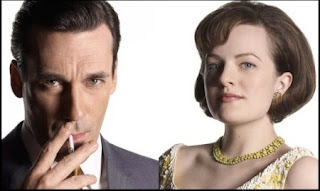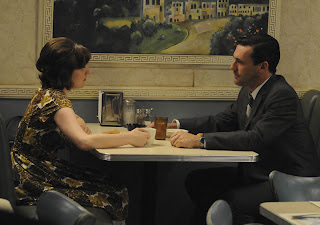 |
| Don Draper and Peggy Olson |
For me, the most endearing element of Mad Men is the humorous and detailed portrayal of developing friendships. Amidst the drinking, cheating, and general woes of the ad agency is the story of office camaraderie. There have always been back stories on different relationships that developed at Sterling Cooper, such as the friendship between Roger and Joan, but season four spends a great amount of time further delving into those relationships. It paints a picture of a time where business loyalty meant a commitment from both sides.
Now that the operations are smaller, there is an even closer knit of relations in the office. Season four gave us such delights as Don and Lane taking in New Year’s Eve, as well as offering a closer look into the drunken camaraderie between Don and Roger. Indeed, Don is a man of many women and men, but of all his office friendships, none compare to his kinship with Peggy. From early in the show, Don and Peggy had a professional and personal spark. Don gave Peggy an opportunity to nurture her talents, and while their story isn’t always happy, they are able to understand each other in a way that surpasses all other office duos. In spite of their differences, Don and Peggy share a common fight to be where they ought not be. It is in this fight for survival that the two trade-off dishing out tough love and gentle support.
Don and Peggy’s friendship did not develop overnight and there are clear and present power dynamics that complicate affairs. There are the obvious gender roles at play and the fact that Don is Peggy’s superior. Don also has a short temper and a tendency to project onto Peggy a lot of his own feelings of inadequacy. And while Peggy is hurt by Don’s verbal outbursts she is engaged in self reflection, and mostly welcoming of his mentorship.
It seems obvious to me that Don’s interest in Peggy is directly related to his own struggles with entitlement. Don wasn’t born with money or a name. He didn’t inherit his position in the company or marry into an account. He used his creative “genius” to con his way into a job and rise to the top of his field. This both limits him and gives him strength. He has less to lose, and that allows him to take greater risks. Don sees the way Peggy takes risks and admires her dedication to the work they do. In the episode where Marilyn Monroe dies, Don asks Peggy how she is doing and is surprised (if only for a quick side-glance of a moment) when Peggy responds, “It’s a good thing we didn’t go with Marilyn/Jackie ad. We would have had to pull everything indefinitely.” While others in the office mourn the loss of a role model, Peggy’s eyes are clearly focused on her career. She does not falter for a moment because she can’t afford it. Don gets that because he too knows that he can’t quit running. They share a common fear and subsequently, a common strength of self.
From the moment Don appears at Peggy’s bedside, the two have shared a level of intimacy that isn’t mirrored in any other professional relationship on the show. In fact, the only time we’ve seen Don be this honest with someone is in his relationship with Anna, and Don turns to Peggy when mourning that loss. In “The Suitcase,” Peggy is the only one in the office brave enough to confront Don’s destructive path. She walks into his office and, with concern asks, “How long do you intend to go on like this?” Moments later she reassures him that he didn’t lose the only person who knew him. Don and Peggy have provided each other with gentle support in a violent world and that support will surely be needed again as the company hangs by a thread. And even as the future of the agency hands in the balance, Don and Peggy march on. While the other partners and employees of Sterling, Cooper, Draper, & Pryce cry into their highballs, Peggy and Don put their nose to the ground and keep fighting for accounts and taking risks.
As the show progresses, I expect to see more conflict between Don and Peggy’s friendship. Peggy has thus far tolerated Don’s destructive side out of admiration and loyalty. I am curious to see how the quickly changing world of the sixties will effect her perceptions of the friendship. I am also curious to see how Don’s engagement will affect the level of admiration that Peggy has previously given him. In “Tomorrowland,” Don proposes to his secretary and we have yet to see what that means for his developing character, but one thing is clear: neither Peggy nor Joan is the least bit pleased about the engagement. As the progressive movement of the sixties marches on, the unspoken gender issues in the office are coming full head. Don and Peggy share the same drive and are invested in the friendship, but they still stand on different levels of the patriarchal power structure. Can their friendship sustain the changing social climate? What will happen as Peggy continues to embrace the rebellion of the sixties youth movement? I am certain that whatever happens, Don and Peggy will continue to be deeply passionate characters whether they have each other’s support or not. I once wished for the destruction of Don Draper. Now, I only want him to be saved. I’m just not sure that it’s Peggy’s (or any other woman’s) responsibility to save him, and I’m not certain that Don isn’t just chasing another dream.
Katie Becker studied at Luther College where she earned a Bachelor’s degree in Communication Studies. She loves saying what’s on her mind and asking inappropriate questions. She recently found the time to start writing again.

